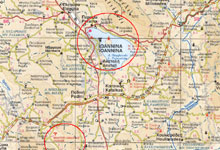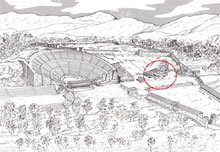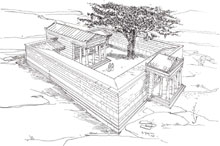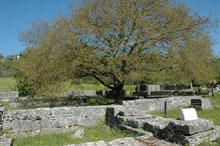 |
Ioannina and Dodoni (red circle bottom of picture)
lie in the inland, at a distance of 60 kilometers from the shores
of the Ionian Sea. In the centre of the upper red circle, right in
the lake of Ioannina one can see the Ioannina islet.
(Map © from Epirus-Thessaly published by Road publications) |
In the prefecture of Ioannina, two monuments constitute a historical continuum.
As the Oracle of Dodoni was slowly sinking into oblivion in the 1st millennia
A.D., having served the whole of Greece for almost a millennium, the history
of the city of Ioannina begins, a city which would become the cultural
and financial centre of the area.
Dodoni, on the northwest of Ioannina, lies on the foot of Mountain Tomaros,
at a height of 640 m. The holy temple of the antiquity is on a small plateau
on the west of Tomaros, and rises to the height of 1974 m. on the east
of Megali Tsouka mountain range.
The scenery is awe inspiring, worthy of an important temple, which even
though it was far away from the political and cultural centres of the antiquity,
it was one of the most famous oracles of the era. It preserved its fame
despite the difficulties people had in accessing it, as it lay at distance
of 47 kilometers from the sea (in direct line) and was on an almost inaccessible
and icy location. The ancient Greeks considered Dodoni the oldest oracle
of Greek space. Herodotus mentions it extensively. On account of his mentioning
of Egypt he writes vividly the following (2.52-7):
 |
| The plateau of Dodoni. Mount Tomaros in the background. |
Now the Pelasgians formerly were wont to make all their sacrifices calling
upon the gods in prayer, as I know from that which I heard at Dodona,
but they gave no title or name to any of them, for they had not yet
heard any, but they called them gods from some such notion as this,
that they had set in order all things and so had the distribution of
everything. Afterwards when much time had elapsed, they learnt from
Egypt the names of the gods, all except Dionysos, for his name they
learnt long afterwards; and after a time the Pelasgians consulted the
Oracle at Dodona about the names, for this prophetic seat is accounted
to be the most ancient of the Oracles which are among the Hellenes,
and at that time it was the only one. So when the Pelasgians asked the
Oracle at Dodona whether they should adopt the names which had come
from the Barbarians, the Oracle in reply bade them make use of the
names.
From this time they sacrificed using the names of the gods, and
from the Pelasgians the Hellenes afterwards received them: but when
the several gods had their birth, or whether they all were from the
beginning, and of what form they are, they did not learn till
yesterday, as it were, or the day before: for Hesiod and Homer I
suppose were four hundred years before my time and not more, and these
are they who made a theogony for the Hellenes and gave the titles to
the gods and distributed to them honours and arts, and set forth their
forms: but the poets who are said to have been before these men were
really in my opinion after them. Of these things the first are said by
the priestesses of Dodona, and the latter things, those namely which
have regard to Hesiod and Homer, by myself.
As regards the Oracles both that among the Hellenes and that in Libya,
the Egyptians tell the following tale.
 |
Αναπαράσταση του Μαντείου Δωδώνης στο τέλος του 3ου αιώνα
π.Χ . Σε κόκκινο κύκλο η θέση της ιερής οικίας.
Σχέδιο Β. Χαρίσης |
The priests of the Theban Zeus
told me that two women in the service of the temple had been carried
away from Thebes by Phenicians, and that they had heard that one of
them had been sold to go into Libya and the other to the Hellenes; and these
women, they said, were they who first founded the prophetic seats among the nations
which have been named: and when I inquired whence they knew so perfectly of this
tale which they told, they said in reply that a great search had been made by
the priests after these women, and that they had not been able to find them,
but they had heard afterwards this tale about them which they were telling. This
I heard from the priests at Thebes, and what follows is said by the prophetesses
of Dodona. They say that two black doves flew from Thebes in Egypt, and came
one of them to Libya and the other to their land. And this latter settled upon
an oak-tree and spoke with human voice, saying that it was necessary that a prophetic
seat of Zeus should be established in that place; and they supposed that that
was of the gods which was announced to them, and made one accordingly: and the
dove which went away to the Libyans, they say, bade the Libyans make an Oracle
of Ammon; and this also is of Zeus. The priestesses of Dodona told me these things,
of whom the eldest was named Promeneia, the next after her Timarete, and the
youngest Nicandra; and the other people of Dodona who were engaged about the
temple gave accounts agreeing with theirs.
I however have an opinion about the
matter as follows:--If the Phenicians did in truth carry away the consecrated
women and sold one of them into Libya and the other into Hellas, I suppose that
in the country now called Hellas, which was formerly called Pelasgia, this woman
was sold into the land of the Thesprotians; and then being a slave there she
set up a sanctuary of Zeus under a real oak-tree; as indeed it was natural that
being an attendant of the sanctuary of Zeus at Thebes, she should there, in the
place to which she had come, have a memory of him; and after this, when she got
understanding of the Hellenic tongue, she established an Oracle, and she reported,
I suppose, that her sister had been sold in Libya by the same Phenicians by whom
she herself had been sold. Moreover, I think that the women were called doves
by the people of Dodona for the reason that they were barbarians and because
it seemed to them that they uttered voice like birds; but after a time (they
say) the dove spoke with human voice, that is when the woman began to speak so
that they could understand; but so long as she spoke a Barbarian tongue she seemed
to them to be uttering voice like a bird: for if it had been really a dove, how
could it speak with human voice? And in saying that the dove was black, they
indicate that the woman was Egyptian. The ways of delivering oracles too at Thebes
in Egypt and at Dodona closely resemble each other, as it happens, and also the
method of divination by victims has come from Egypt.
[Translated by G. C. Macaulay.]
Dodoni is mentioned in the story of Jason of the Argonauts, since the former
after being urged by Goddess Athena, went to the holy temple to get a branch
from the holy oak tree which he would place on the bow of his ship for protection
and guidance through their journey to Colchis. Also, Homer’s Achilles offers
libations to Zeus in Dodoni, while Ulysses consulted Dodoni in order to learn
how he will return home.
But the king said Ulysses had gone to Dodona that he might learn Zeus’s mind
from the god's high oak tree, and know whether after so long an absence he
should return to Ithaca openly, or in secret.
[Translated by Samuel Butler.]
 |
 |
Reconstruction of the holy temple of the 3rd century
B.C.
(Sektch by B. Charisis) |
The holy temple today. The oak tree that stands there
was planted right in the spot where the ancient tree was. |
| |
Archaeological finds excavated at the holy temple date back to 2.000 B.C.,
when the Great Goddess, the goddess of fertility, was worshipped there, before
it was gradually replaced by the cult of Zeus and his wife Dioni.
As Homer testifies, the priests based on the rustle of the holy oak’s leaves
and the flying of the doves interpreted the will of the Gods; in order to enhance
their clairvoyant powers they did not wash their feet and they actually slept
on the bear ground.
The holy temple remained active until the 4th century A.D., when the
Christians prevailed. This can be attested by the ruins of an old christia
church on the eastern part of the temple. Dodoni was actually the holy
temple of the people of Epirus, as Dion was for the Macedonians and Delphi
was for the people of southern Greece. During the thriving of the people
of Epirus (3rd and 2nd century B.C.), Dodoni was embellished with new
buildings, ant its imposing theatre was built.